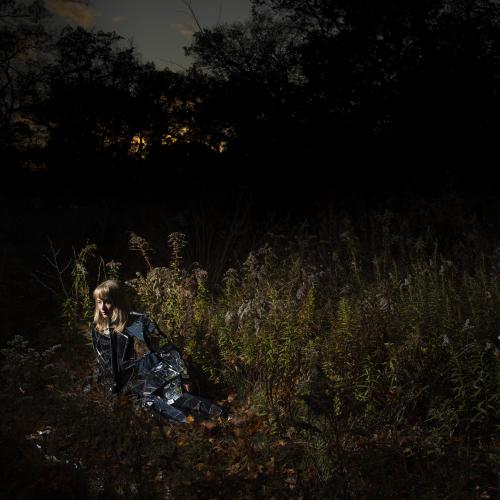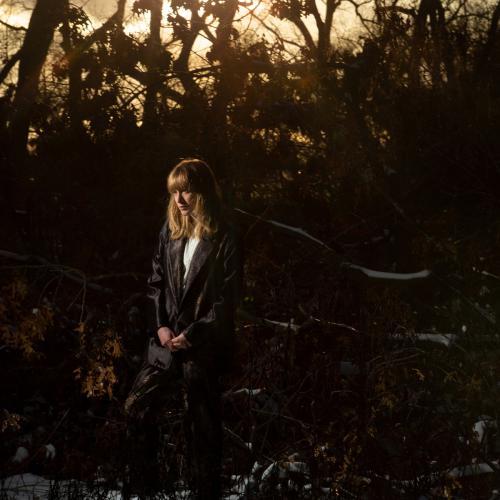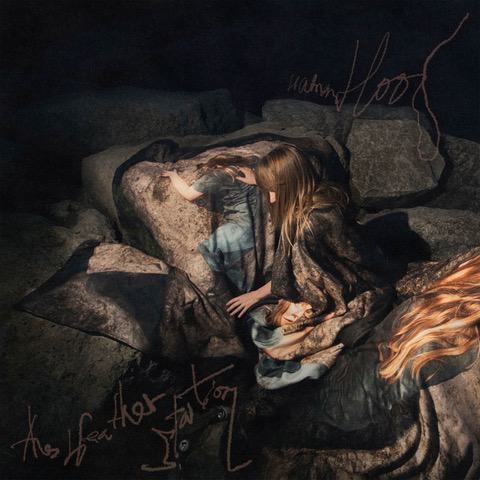Band: The Weather Station
Album: Humanhood
VÖ: 17.01.2025
Label/Vertrieb: Fat Possum / Membran
Website: http://www.theweatherstation.net
"Tamara Lindeman sinniert in 'Neon Signs' über Desillusionierung, eine Transaktionskultur, Lügen und die Hartnäckigkeit des Begehrens ... während sich ihre Band allmählich um sie schart, sich versammelt, um sie durch ihre Zweifel zu treiben, und sich auflöst, wenn sie es nicht kann." - The New York Times
The Weather Station Live in DE 2025
26.02. Hamburg, Nochtspeicher
28.02. Berlin, Silent Green
The Weather Station veröffentlicht das Album "Humanhood" am 17. Januar über Fat Possum. Während man von vielen Singer-Songwritern annimmt, dass sie Tagebuchschreiber sind, war das bei The Weather Station, dem Projekt von Tamara Lindeman, nie so einfach. Ihre Texte sind in der Ich-Perspektive geschrieben, aber sie enden nicht dort; vielmehr verzweigen sie sich in philosophische Fragezeichen, existenzielle Knoten, verschlungene Fäden der Erinnerung und Allegorien. In "Body Moves" singt sie: "you thought you knew what it was you loved / then again - look at this mess / your body fooled you / your body moved you - yes.". In Humanhood ist der Körper eine Konstante, die als Verräter oder vielleicht auch als Lehrer fungiert.
Ignorance aus dem Jahr 2021, ein "Meisterwerk mit gebrochenem Herzen" (The Guardian), schlug kommerziell hohe Wellen und wurde von der Kritik nahezu weltweit gelobt. Neben der Musik fand sich Lindeman in der unwahrscheinlichen Position wieder, eine Art Sprecherin der Klimatrauer zu werden; sie brachte dieses Thema in den Rolling Stone und Pitchfork, die New York Times und The New Yorker. Doch als der Tourneezyklus unter Hochdruck weiterging, geriet sie hinter den Kulissen in eine persönliche Krise. Vor dem Hintergrund der andauernden Klimakrise, den Wellen von Fehlinformationen, den Verschwörungstheorien und den kämpfenden Theorien über die menschliche Natur, fühlte sich ihre Erfahrung weniger persönlich, sondern eher kollektiv an. Und so wurde sie neugierig. Und sie schrieb Lieder.
Mit einer langen Liste von Songfragmenten und einer Reihe von abstrakten Missionen begaben sich Lindeman und Co-Produzent Marcus Paquin Ende 2023 in die Canterbury Music Studios. Mit dem Schlagzeuger Kieran Adams, dem Perkussionisten Philippe Melanson und dem Bassisten Ben Whiteley (der kraftvollen Rhythmusgruppe von Ignorance) sowie den Improvisatoren für Neue Musik Karen Ng und Ben Boye entstand eine Musik der Kontraste: geradliniges Schlagzeug trifft auf sanft drapiertes Klavier und wandernde Klarinette, organische und synthetische Töne verdoppeln und spalten sich. Lindeman brachte einen unterschwelligen britischen Folk-Einfluss in die Melodien ein und landete schließlich an der Schnittstelle zwischen Disco-Schlagzeug und abstrakter Perkussion, Neue-Musik-Saxophon und Folk-Melodie - und versucht, die Grenzen in alle Richtungen zu verschieben.
Humanhood ist strahlend und treibend, diskursiv und seltsam. Es ist eine Platte voller intensiver Details: Klaviertöne, die sich in Rauschen auflösen, Geigen, die sich aus einer Wolke von Becken materialisieren. Klare, kraftvolle Popsongs treten in den Vordergrund oder tauchen ganz plötzlich auf, bevor sie abrupte Wendungen, Klangverschiebungen und Acid-Wash-Synthie-Fadeouts erfahren. Jeder Song spiegelt klanglich und musikalisch den im Text beschriebenen Gemütszustand wider; er bewegt sich von weit entfernt bis klaustrophobisch, überwältigend bis wunderschön. Hört man das Album von vorne nach hinten, so beschreibt es eine Reise von der Dissoziation zurück zur Verbindung; eine Reise, die sich in Form, Klang und Text widerspiegelt - und in der Entstehung der Platte selbst.
PreOrder das Album „Humanhood“!
+++++++++++
Album: How Is It That I Should Look At The Stars
VÖ: 04.03.2022
Label/Vertrieb: Fat Possum / Membran
Website: http://www.theweatherstation.net
Vor einem Jahr veröffentlichten The Weather Station Ignorance, eines der meistgelobten Alben des Jahres 2021. Heute kündigt Tamara Lindeman How Is It That I Should Look At The Stars an, ein neues Album, das am 4. März bei Fat Possum erscheint, und präsentiert die erste Single und das Video "Endless Time". How Is It That I Should Look At The Stars ist als Begleitstück zu Ignorance zu verstehen. Es sind Songs, die zur gleichen Zeit geschrieben wurden, die sich emotional verbinden und viele der gleichen Themen behandeln: Trennung und Konflikt, Liebe, Vögel und Klima-Gefühle. How Is It That I Should Look At The Stars wurde in nur drei Tagen live aufgenommen und ist schmerzhaft intim, voller Atem, Stille und Details.
"Als ich Ignorance schrieb, war das eine Zeit intensiver Kreativität, und ich schrieb mehr Songs als je zuvor in meinem Leben. Die Songs, die auf dem Album sein sollten, waren von Anfang an klar, aber als ich meinen Schreibweg fortsetzte, tauchten immer wieder Songs auf, die keinen Platz auf dem Album hatten, das ich mir vorstellte. Lieder, die einfach und rein waren, fast naiv. Lieder, die viele der gleichen Fragen und Realitäten ansprachen wie Ignorance, aber auf eine innerlichere, nachdenklichere Weise." Lindeman führt weiter aus: "So begann ich, mir How Is It That I Should Look At The Stars vorzustellen, ein ruhiges, seltsames Album mit Balladen. Ich stellte es mir nicht als Nachfolger von Ignorance vor, sondern eher als Begleitstück; der Mond zu seiner Sonne."
Nicht lange nach der Fertigstellung von Ignorance beschloss Lindeman, dieses Album zu ihren eigenen Bedingungen zu machen, indem sie selbst für das Geld aufkam und die Labels nicht informierte. Sie stellte eine neue Band zusammen und vermittelte ein neues Ethos: Die Musik sollte sich ungeerdet anfühlen, mit Raum, Stille und Sensibilität vor allem. Auf dieser Platte gibt es kein Schlagzeug, keine Percussion; in Abwesenheit von Rhythmus dehnt sich die Zeit und wird elastisch. Mit Christine Bougie (Gitarre und Lap Steel), Karen Ng (Saxophon und Klarinette), Ben Whiteley (Kontrabass), Ryan Driver (Klavier, Flöte und Gesang) und Tania Gill (Wurlitzer, Rhodes und Klavier) besteht die Band aus einigen der besten Musiker der Jazz- und Improvisationsszene Torontos.
How Is It That I Should Look At The Stars wurde vom 10. bis 12. März 2020 live in den Canterbury Music Studios in Toronto aufgenommen. Mit Jean Martin als Co-Produzent sang und spielte Lindeman live Klavier, während die Band ihre Begleitung improvisierte. Als die Band das Studio betrat, war Covid-19 eine Neuigkeit und nicht in aller Munde, aber nur drei Tage später hatte sich alles geändert. Auf dem heutigen "Endless Time" singt Lindeman über ein Gefühl des Unbehagens, wobei er den Verlust von Beziehungen mit der Angst vor der drohenden Klimakrise verwebt. Lindeman kommentiert: "In Toronto lebe ich in einer Welt des überwältigenden Überflusses; Früchte und frisches Gemüse werden das ganze Jahr über aus Chile, Kalifornien und Malaysia eingeflogen. Als ich eines Tages vor einem Obststand in der Nachbarschaft stand, fragte ich mich, wie ich aus der Zukunft auf diese Zeit zurückblicken würde; ob ich mich eines Tages an eine Zeit des Überflusses und des Reichtums erinnern würde, die ich zu diesem Zeitpunkt noch gar nicht richtig begriffen hatte, und ich fragte mich, wie es sich anfühlen würde, an dieser Schwelle des Wandels zu stehen. Ich fragte mich auch, ob wir nicht schon dort waren. Das Lied wurde lange vor der Pandemie geschrieben, aber als wir es am 11. März 2020 aufnahmen, fühlte es sich auf unheimliche Weise vorausschauend an. Der Tag, an dem er aufgenommen wurde, war wirklich das Ende einer endlosen Zeit, und wie immer weiß ich nicht, woher der Song das wusste." Irgendwie fängt die Musik diese Instabilität ein; sie ist ungeerdet und durchsichtig, sie schwebt und treibt./
*Watch The Weather Station’s Video for “Endless Time”* <https://www.youtube.com/watch?v=PsgO4EnCf2g>
Man könnte sagen, dass das Grundthema von Ignorance die Verletzlichkeit war; Verletzlichkeit, die unbemerkt und uneingestanden bleibt, und der Schaden, der aus dieser Auslöschung resultiert. Auf How Is It That I Should Look At The Stars kommt diese Verletzlichkeit zum Ausdruck. Es ist ein Album von ungeheurer Sensibilität, eine Aufnahme einer Band und eines Menschen, die es wagen, sich ohne Entschuldigung der Sanftheit zu nähern.
The Weather Station gehen nächsten Monat auf eine lang erwartete Tournee, um Ignorance und How Is It That I Should Look At The Stars zu unterstützen. Die Konzerte vor dem 12. Februar werden auf später im Frühjahr verschoben (einige wurden abgesagt). Alle Konzerte sind nun im Vorverkauf http://www.theweatherstation.net/tour <http://www.theweatherstation.net...
Pre-order /How Is It That I Should Look At The Stars <https://theweatherstation.lnk.to/HIITISLATS>
How Is It That I Should Look At The Stars Tracklist:
1. Marsh
2. Endless Time
3. Taught
4. Ignorance
5. To Talk About
6. Stars
7. Song
8. Sway
9. Sleight of Hand
10. Loving You
Vorherige Infos:
Album: Ignorance (Deluxe)
VÖ: 29.09.2021
Label/Vertrieb: Fat Possum / Membran
Website: http://www.theweatherstation.net
Es war ein bemerkenswertes Jahr für THE WEATHER STATION "Ignorance" ist eines der beliebtesten Alben des Jahres 2021 und brachte Tamara Lindeman eine Nominierung für den Polaris Music Prize, ein großartiges Tiny Desk (At Home) Konzert und ihr US-Fernsehdebüt bei CBS This Morning: Saturday ein.
Heute feiert sie weiter und kündigt die zweibändige Doppel-LP "Ignorance (Deluxe)" an, die heute digital und am 19. November physisch über Fat Possum erscheint. "Ignorance (Deluxe)" enthält neben dem originalen Album, Live- und Piano-Versionen ausgewählter Songs sowie zwei bisher unveröffentlichte Stücke, darunter "Look“ und "Better Now“. Lindeman erklärt weiter die Idee hinter Ignorance (Deluxe): "Wann immer man etwas macht, muss man Dinge weglassen; das ist ein wichtiger Teil des Prozesses, aber dennoch ein schmerzhafter. Ich bin froh, dass ich die Gelegenheit habe, die nicht eingeschlagenen Wege noch einmal zu beschreiten und einige von ihnen doch noch herauszulassen; ruhige Versionen von Songs, die in den Rhythmus umgeleitet wurden, zwei der Songs, die wir aufgenommen, aber auf dem Album weg gelassen haben, und einige Live-Versionen der Songs, die seit den Aufnahmen entstanden sind. Es war überwältigend, dass dieses Album so liebevoll aufgenommen wurde, und es ist wunderbar, nun die Möglichkeit zu haben, mehr davon in die Welt zu bringen."
Pressezitate zu „Ignorance“
"ein bezauberndes Indiepop-Kunstwerk“ - Stern.de
"smarter, groovebetonter Popsound“ - Musikexpress
"Hell und sanft, sehnsuchtsvoll klagend, aber auch zutiefst beruhigend.“ - Spiegel
"ein homogenes Klanggemälde“ - Rolling Stone
"eine wunderbare, dynamische und dennoch eindringliche Platte“ - Laut.de
"Tamara Lindeman behandelt Ignorance wie eine Trennungsplatte mit ihrem eigenen sterbenden Planeten.“ - Rolling Stone US , Best Albums of 2021 So Far
"Ignorance ist ein erfrischendes und ergreifendes Kapitel in einer bereits beeindruckenden Karriere.“ - Stereogum, #2 Best Albums of 2021 So Far
"Ignorance taucht tief in den Herzschmerz ein und kommt mit einer Reihe fantastischer Songs daher.“ - The Guardian, Best Albums of 2021 So Far
"Eine ungewöhnlich bewegende Erkundung der Trauer und Verleugnung, die unser unaufhaltsames Abgleiten in die Klimakrise begleitet.“ - SPIN Best Albums of 2021 So Far
"[Ignorance] ist ein Album, dessen Sound sich so ausdehnt, dass er der Größe seiner konzeptionellen Ambition entspricht.“ - AV Club, Best Albums of 2021 So Far
"[Ignorance] ist ein atemberaubend sicheres Eintauchen in eine glatte, schwirrende Jazz-Pop-Wildnis.“ - Paste, #2, Best Albums of 2021 So Far
"Ignorance (Deluxe)"Tracklist
Vol. 1
1.Robber
2. Atlantic
3. Tried To Tell You
4. Parking Lot
5. Loss
6. Separated
7. Wear
8. Trust
9. Heart
10. Subdivisions
Vol. 2
1. Robber (Live)
2. Atlantic (Live)
3. Loss (Live)
4. Subdivisions (Piano Version)
5. Better Now
6. Tried To Tell You (Piano Version)
7. Parking Lot (Piano Version)
8. Heart (Piano Version)
9. Look
Videos:
Live in Deutschland:
28.03.2022: Berlin - Frannz Club
04.04.2022: Hamburg - Nochtwache
05.04.2022: Köln - Blue Shell
06.04.2022: München -Milla
Band: The Weather Station
Album: Ignorance
VÖ: 05.02.2021
Label/Vertrieb: Fat Possum / Membran
Website: http://www.theweatherstation.net
“Most people are afraid of the dark…Many adults fear, above all, the darkness that is the unknown, the unseeable, the obscure. And yet the night in which distinctions and definitions cannot be readily made is the same night in which love is made, in which things merge, change, become enchanted, aroused, impregnated, possessed, released, renewed.” - Rebecca Solnit
Ignorance, the new album by the The Weather Station, begins enigmatically; a hissing hi hat, a stuttering drum beat. A full minute passes before the entry of Tamara Lindeman’s voice, gentle, conversational, intoning; “I never believed in the robber”. A jagged music builds, with stabbing strings, saxophone, and several layers of percussion, and the song undulates through five minutes of growing tension, seesawing between just two chords. Once again, Toronto songwriter Tamara Lindeman has remade what The Weather Station sounds like; once again, she has used the occasion of a new record to create a new sonic landscape, tailor-made to express an emotional idea. Ignorance, Lindeman’s debut for Mississippi label Fat Possum Records, is sensuous, ravishing, as hi fi a record as Lindeman has ever made, breaking into pure pop at moments, at others a dense wilderness of notes; a deeply rhythmic, deeply painful record that feels more urgent, more clear than her work ever has.
The album began, in Lindeman’s telling, when she became obsessed with rhythm; specifically straight rhythm, dance rhythm, those achingly simple beats that had never showed up on a Weather Station album before. “I realized how profound and emotional straight time could be” she says; “those eternal dance rhythms, how they effect you on a physical level.” Lindeman’s sense of time has always been elastic; movable, responding to the moment. But embracing straight time opened new musical territory for her; “I saw how the less emotion there was in the rhythm, the more room there was for emotion in the rest of the music, the more freedom I had vocally.” She began to envision a band and a music as a sort of bedrock, a structure firm enough to hold the vulnerability of the songs.
The album marks her first experience writing on keyboard, not guitar, and her first time building out arrangements, both with keyboard and with MIDI, before bringing them to a band. Ignorance lets go of most of the folk or roots inclinations that coloured Weather Station albums of the past; whereas the S/T felt steeped in Young and Dylan, this album has flashes of The Colour of Spring or Avalon or Tusk. Most of the songs are underlaid with pure rhythm: a disco beat, a rock beat, played with emotion and precision by Kieran Adams (Diana). The bass, played by Ben Whiteley, similarly hews to the straight and narrow; sometimes not changing notes for minutes at a time. But these straight musical elements are paired deliberately with elements of chance and freedom. Percussionist Philippe Melanson (Bernice) was given his own booth and free reign to improvise on each take, filling each song with rhythmic surprise. Lindeman brought in jazz musicians Brodie West (The Ex) on saxophone and Ryan Driver (Eric Chenaux) on flute, asking them to work against the music in their improvisations. The band was rounded out by Johnny Spence (Tegan and Sara) on keys and Christine Bougie (Bahamas) on guitar; Lindeman played piano, sang, and contributed distorted guitar solos. Montreal producer Marcus Paquin (Arcade Fire) co-produced, with Lindeman, and also mixed the record. It was the first time Lindeman had financial headroom to be ambitious in the studio, an experience she wanted to lean into, moving deliberately away from the lo fi recording processes she adhered to in the past. Indeed the album is confident, polished, no creaking edges, no hum or hiss; it’s so easy to listen to one almost doesn’t notice how heavy it is.
Ignorance is deeply emotional, the lyrics roiling with conflict. “Separated” enumerates an acidic series of miscommunications; “separated by the relief you want to feel / separated by the belief this cut can heal”, and “Trust” describes a divorce, whether literal or metaphysical. On “Indifference” a song Lindeman almost cut from the record several times, because “it felt too vulnerable”, she sings of love, and softness: “my dumb touch / is always reaching / for green for soft / for yielding.” The album sounds profoundly personal; but Lindeman waves off personal questions as to the subject matter of the album. She prefers instead to talk about the planet. The album was written in winter of 2019 and recorded that spring (COVID-19 delays are the reason why we are only hearing it now, in 2021). “The deepest emotional experience I had that winter” Lindeman explains, “was reading the IPCC special report on 1.5 degrees”. She’s serious; though she notes that “nobody believes me when I say that.” She attributes that to a failure of imagination, a lack of belief culturally that a relationship to the world can be as profound, as emotional, as a relationship to another person. “The songs function on a cosmic and personal level” she says, “it’s always been that way for me”.
Indeed, the natural world is everywhere on this record. But it is not there to provide scenery or beauty; rather it intrudes with force and poignancy. “Parking Lot”, the closest Lindeman has ever come to a pop single, spends its full three minutes in contemplation of a bird; “Atlantic” finds the narrator prone on a cliff, watching a sunset as frightening as it is beautiful, “blood red floods the Atlantic”. The divorce described on ‘Trust’ feels metaphysical; with evidence presented to court in the form of “baskets of wild roses / crumpled petals and misshapen heads of reeds and rushes / bodies of the common birds / robins crows and thrushes”. Again and again, the narrator of the album confronts characters who turn away from love; the bumbling subject ‘Tried To Tell You’ “with blood on your hands / from the river inside / you try to deny it” the subject of ‘Loss’, laid out in bed, so consumed by story that they cannot see straight. “Don’t ask me for indifference / don’t come to me for distance” Lindeman sings, repeatedly describing her own vulnerability; “I don’t have the heart / to conceal my love.” Whether or not these songs are meant to be only about the planet, they do not resemble protest songs, with their simplicity and clarity. Rather, the album is shadowed by brokenness and misconnection, a sort of elemental and ubiquitous pain, as Lindeman sings; “Everywhere we go there is an outside / over all these ceilings hangs a sky / and it kills me when I / see some bird fly”.
On the cover, Lindeman lays in the woods, wearing a hand made suit covered in mirrors. She was struck by the compulsion to build a mirror suit on tour one summer, assembling it in a hotel room in PEI and at a friend’s place in Halifax. “I used to be an actor, now I’m a performer” she says. In those roles, she points out, she often finds herself to be the subject of projection, reflecting back the ideas and emotions of others. On the album, she sings of trying to wear the world as a kind of ill fitting, torn garment, dangerously cold; “it does not keep me warm / I cannot ever seem to fasten it” and of walking the streets in it, so disguised, so exposed. Photographed by visual artist Jeff Bierk in midday, the cover purposefully calls to mind Renaissance paintings; with rich blacks and deep colour, and an incongruous blue sky glimpsed through the trees.
The title of the album, Ignorance, feels confrontational, calling to mind perhaps wilful ignorance, but Lindeman insists she meant it in a different context. In 1915 Virginia Woolfe wrote: “the future is dark, which is the best thing a future can be, I think.” Written amidst the brutal first world war, the darkness of the future connoted for Woolfe a not knowing, which by definition holds a sliver of hope; the possibility for something, somewhere, to change. In french, the verb ignorer connotes a humble, unashamed not knowing, and it is this ignorance Lindeman refers to here; the blank space at an intersection of hope and despair, a darkness that does not have to be dark.











